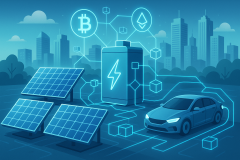
- Daylight Energy secures $75M to grow its decentralized physical energy network.
- Framework Ventures leads funding; A16z Crypto, Coinbase Ventures join in.
- New DayFi protocol links energy infrastructure yields to DeFi investors.
Daylight Energy has raised $75 million in new funding to accelerate the growth of its decentralized energy network, marking a major milestone for the startup as it aims to bring blockchain-based innovation to the physical energy infrastructure sector.
The round combines both equity and project finance capital, underscoring growing investor interest in decentralized physical infrastructure networks (DePIN).
Funding structure and investor participation
The $75 million round includes $15 million in equity and $60 million in non-recourse project finance capital, which is secured directly against infrastructure assets, according to CEO Jason Badeaux.
This type of financing structure allows repayment from the project’s own cash flows rather than relying on the company’s balance sheet.
Framework Ventures led the $15 million equity raise, joined by several notable venture backers including A16z Crypto, Lerer Hippeau, M13, Room40 Ventures, EV3, Crucible Capital, Coinbase Ventures, and Not Boring Capital.
The project finance portion was led by Turtle Hill Capital, according to a company statement.
Daylight plans to use the new capital to advance its position in the DePIN ecosystem, particularly focusing on decentralized energy distribution.
The company previously raised $9 million in Series A funding in 2023, also led by A16z Crypto, which has remained one of its core supporters.
Expanding the DePIN vision in energy
Founded in 2022, Daylight Energy is developing a decentralized protocol that enables users to connect their energy devices—such as thermostats, batteries, electric vehicles, and solar inverters—to its application.
In return, participants earn rewards for contributing to the network’s distributed infrastructure.
The concept builds on the growing DePIN movement, which seeks to decentralize ownership and control of physical assets like telecommunications, storage, and energy infrastructure through blockchain technology.
“To build the largest





